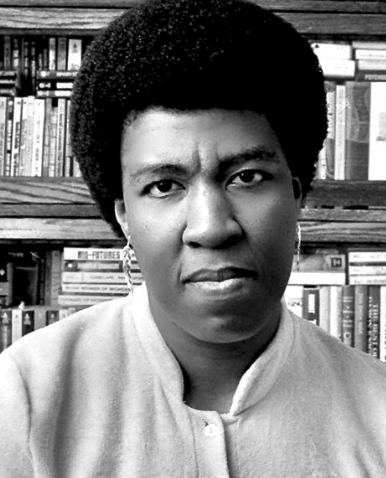On this date in 1947, science fiction writer Octavia Estelle “Junie” Butler was born in Pasadena, Calif., the only child of Octavia Guy, a housemaid, and Laurice Butler, who shined shoes for a living. Her father died when she was 7 and she was raised by her mother and maternal grandmother.
She graduated from Pasadena City College (1968), then attended California State University and the University of California-Los Angeles. She was encouraged by Harlan Ellison to write. The back of a notebook kept by the young Octavia features a page of confident resolutions, vowing “I shall be a bestselling writer. … My books will be read by millions of people! I will buy a beautiful home in an excellent neighborhood. I will help poor black youngsters broaden their horizons.” (octaviabutler.com)
She struggled, rising daily at 2 a.m. to write before various jobs as dishwasher, telemarketer, even potato chip inspector. But she made good on her vow. Her debut novel Patternmaster (1976) was the first in a five-part series about a group of telepaths ruled by an immortal African. Amazon Studios and JuVee Productions in 2021 started developing a series based on the books, beginning with Wild Seed.
She started writing science fiction after realizing the paucity of Black characters in the genre. Her dystopian writings include themes on Black injustice, climate change and women’s rights. She told the Los Angeles Times in 1998, “I’m black, I’m solitary, I’ve always been an outsider.” (New York Times obituary, March 1, 2006)
In Kindred (1979), a woman travels back in time to an antebellum plantation to save a white, slaveholding ancestor and thus, her own life. Her other books include Parable of the Sower (1993), Parable of the Talents (1998) and Dawn (1987), which was developed for TV by director Ava DuVernay. Dawn is part of Butler’s Xenognesis trilogy. She was working at the time of her death on another sequel, The Parable of the Trickster. The Parable novels, centering on the founding of a new religion called Earthseed, predicted the rise of the Religious Right.
Butler drew on New Testament stories for the Parable books but fell away from religious belief in her teen years, said Natalie Russell, assistant curator at the Huntington Library in Pasadena, where Butler’s materials are archived. “Butler talks about in interviews and other places that she had a very strict Baptist upbringing and that it informed her whole life,” Russell said. “It certainly informed her work and not just in a sense of morality. Its ideas and tropes and were something she drew on for her characters and plots.” (Religion Unplugged online magazine, Nov. 13, 2020)
Butler received two Hugo Awards. She became in 1995 the first science fiction writer to be awarded a MacArthur Foundation fellowship. She received a PEN Award for Lifetime Achievement in 2000 and reached the New York Times best-seller list 14 years after her death.
Her heroines include a 15-year-old in the short story “The Evening and the Morning and the Night,” who rejects belief in a god after her parents die of an incurable disease she has inherited. Butler never married, calling herself “comfortably asocial” and a hermit. With a large frame and standing 6 feet tall, she had health problems, including high blood pressure, and died at age 58 after a fall, perhaps from a stroke, outside her home in Lake Forest Park, Washington. (D. 2006)


